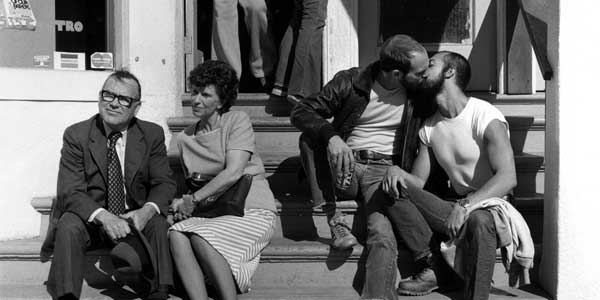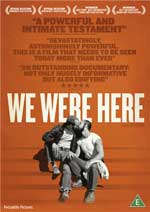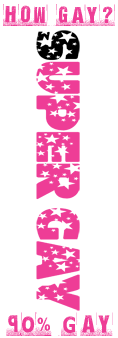
Director: David Weissman
Running Time: 105 mins
Certificate: E
Release Date: December 5th, 2011

Although it’s a bit of a shame We Were Here didn’t hit DVD last week, just in time for AIDS Awareness Day on December 1st, the powerful documentary about the impact of HIV and AIDS in San Francisco in the 1980s has now been released. It’s already received plenty of plaudits, including being shortlisted for the Best Documentary Oscar.
We Were Here consists of interviews with San Franciscans who lived through the early years of the emergence of AIDS, giving testimony about its effect on them and those around them. For a younger generation for whom HIV has largely seemed like a manageable condition (whether that’s the truth or not), it’s sobering stuff. While I can remember the heavy-handed AIDS adverts with falling gravestones when I was a kid, I was too young to be aware of it when it was a completely mysterious condition that nobody understood and which was quickly dubbed ‘gay cancer’.
The participants in We Were Here talk about that time and really get across what a scary situation it must have been. Friends were suddenly stricken with Kaposi’s sarcoma, a rare cancer that usually only affects old people, but was suddenly popping amongst young gay men. The film then follows things through to when the causes of the disease began to be understood, even though at the time there was no treatment.
Perhaps most interesting here is the politics. At the time, many gay men viewed man-on-man sex and the ability to have it with as many people as you wanted in an open way as a political act (although you do have to wonder whether the desire to have lots of sex was the chicken or egg here, as they’d have probably done it whether they thought it was political or not). As a result when a disease emerged that was passed between gay men via sex (and which initially seemed to be only affecting gay people), it butted up against the ideology of free love in unexpected ways.
It might have been nice if We Were Here delved into the political side of the early AIDS crisis a little more, particularly as many say if it weren’t for a grass roots efforts of gay men forcing change, the Reagan Administration would have been happy to continue doing very little about the disease. The film feels like it’s assuming a basic knowledge of the history of AIDS, which may be true for those in their 40s and older but may well not be for those younger than that. However it tells you enough that you can glean what happened, while the film itself concentrates on the personal experiences of those who were there. We Were There, as the title suggests, assumes you know at least the dry basics of the crisis, with the interviewees filling it the reality of what it was like to be there.
This approach is most powerful when the participants are talking about when AIDS was decimating the gay population. People talk about losing their boyfriend just days after losing one of their best friends and a couple weeks before another passed away. As one of the interviewees says, he agreed to be part of the documentary because so few people he knew back then are around anymore, and he’s essentially testifying for them. All this is backed up with often powerful footage from the 80s, with the endless obituaries and images of people in their final days particularly moving.
It was a terrible time for gay people, but one which at least ends on a note of hope, and not just because of the new therapies that have allowed people with HIV to live decades longer than they could have imagined in the 1980s. It was also a make-or-break make moment for the gay community, a time that could have destroyed the bonds that had grown up between gay people (allowing the political right to swoop in and crush gay liberation) but which actually saw people come together in a truly inspiring way.
We Were Here is both horrifying and stirring, scary and hopeful, with plenty of powerful testimony from those who were there on the frontlines of the AIDS crisis in San Francisco. The subject may sound depressing, but while some of it is definitely sobering, it is ultimately an inspiring tribute to the tens of thousands of gay men who died in the 80s (and of course while it’s not the subject of this documentary, many more who can’t afford combination therapy are dying now).
During some of my old man moments, I do despair at how little gay people know about the history of homosexuality. I’m not saying I’m the fount of all knowledge on everything gay (far from it), but it is a shame that if you said the words ‘Mattachine’, ‘Christopher Street’ or ‘Wolfenden Report’ in most British gay bars, you’d be met with a sea of blank stares. To be honest it’s not totally gay people’s fault, because history as taught in school doesn’t even hint that there’s a gay history to be ignorant of.
Even so, it does surprise me more people aren’t curious about how we got to this point, particularly because things such as the legalisation of homosexuality and the AIDS crisis are relatively recent and with issues like gay marriage, it’s a history that’s still very much alive. However most people seem satisfied that the whole of gay history consisted of Ancient Greeks, a big gap until Oscar Wilde, and then perhaps Stonewall – and that’s about it. However there’s a lot more to it than that, which is worth knowing about as it explains so much about gay culture as it exists now. It was after all the 1980s AIDS crisis that has informed attitudes to safe sex, changed the course of the gay movement and caused many other shifts that effect gay people today, whether they realise it or not.
We Were Here works is a powerful reminder of a defining moment in gay history. It’s more timely than ever as HIV infections are rising, partly because many younger people simply can’t remember when AIDS was a truly terrifying thing and they perhaps need to realise that while treatments have changed, it’s still something it’s worth doing everything you can to protect yourself from.
Overall Verdict: At times shocking and yet also incredibly moving, We Were Here is a frontlines account of the AIDS crisis that makes fascinating viewing. And for many it will be a sobering reminder that if they’d been born just a few years earlier, things could have been very different for them.
Reviewer: Tim Isaac





Leave a Reply (if comment does not appear immediately, it may have been held for moderation)